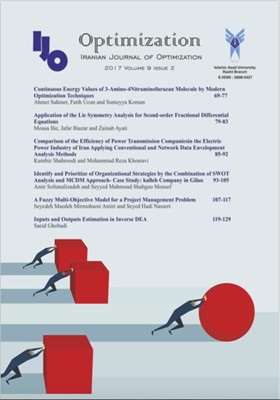A fuzzy multi-objective model for a project management problem
محورهای موضوعی : linear ProgrammingSeyedeh Maedeh Mirmohseni Amiri 1 , Seyed Hadi Nasseri 2
1 - Mathematics and Information Science, Key Laboratory of Mathematics and Interdisciplinary Sciences of Guangdong Higher Education Institutes, Guangzhou University, China
2 - Department of Mathematical Sciences, Mazandaran University, Babolsar, Iran
کلید واژه: Fuzzy AHP, multi-objective Project management decision problem, Interactive fuzzy multi-objective linear programming (i-FMOLP), Weighted Additive, linear membership functions, &alpha, -cut approach,
چکیده مقاله :
In this research, the multi-objective project management decision problem with fuzzy goals and fuzzy constraints are considered. We constitute α-cut approach and two various fuzzy goal programming solution methods for solving the Multi-Objective Project Management (MOPM) decision problem under fuzzy environments. The Interactive fuzzy multi-objective linear programming (i-FMOLP) and Weighted Additive approaches are proposed for solving multi-objective PM decision problem where fuzzy information are demonstrated by using linear membership functions (LMF). The proposed approaches effort contemporarily to minimize the total project costs, total completion time and total crashing costs and the several constraints such as the time between events i and j, the crashing time for activity (i,j) and the total budget capital. The weight of criteria for each objective function base on project DM preference degree computed with Fuzzy AHP technique. The performance analysis calculated with a set of distance metric for i-FMOLP and Weighted Additive solution methods that represent uncertainty goals and constraints in PM decision problem with ideal solution in an industrial case study is compared.
In this research, the multi-objective project management decision problem with fuzzy goals and fuzzy constraints are considered. We constitute α-cut approach and two various fuzzy goal programming solution methods for solving the Multi-Objective Project Management (MOPM) decision problem under fuzzy environments. The Interactive fuzzy multi-objective linear programming (i-FMOLP) and Weighted Additive approaches are proposed for solving multi-objective PM decision problem where fuzzy information are demonstrated by using linear membership functions (LMF). The proposed approaches effort contemporarily to minimize the total project costs, total completion time and total crashing costs and the several constraints such as the time between events i and j, the crashing time for activity (i,j) and the total budget capital. The weight of criteria for each objective function base on project DM preference degree computed with Fuzzy AHP technique. The performance analysis calculated with a set of distance metric for i-FMOLP and Weighted Additive solution methods that represent uncertainty goals and constraints in PM decision problem with ideal solution in an industrial case study is compared.
Amid, A., Ghodsypour, S. H., & O’Brien, C. (2009). A weighted additive fuzzy multiobjective model for the supplier selection problem under price breaks in a supply chain. International Journal of Production Economics, 121(2), 323-332.
Bellman, R. E., & Zadeh, L. A. (1970). Decision-making in a fuzzy environment. Management science, 17(4), B-141.
Chang, D. Y. (1992). Extent analysis and synthetic decision. Optimization techniques and applications, 1(1), 352-355.
Deng, H. (1999). Multicriteria analysis with fuzzy pairwise comparison. International journal of approximate reasoning, 21(3), 215-231.
El-Wahed, W. F. A., & Lee, S. M. (2006). Interactive fuzzy goal programming for multi-objective transportation problems. Omega, 34(2), 158-166.
Ertuğrul, İ., & Karakaşoğlu, N. (2009). Performance evaluation of Turkish cement firms with fuzzy analytic hierarchy process and TOPSIS methods. Expert Systems with Applications, 36(1), 702-715.
Kahraman, C., Cebeci, U., & Ruan, D. (2004). Multi-attribute comparison of catering service companies using fuzzy AHP: The case of Turkey. International Journal of Production Economics, 87(2), 171-184.
Lai, Y. J., & Hwang, C. L. (1994). Fuzzy multiple objective decision making. In Fuzzy Multiple Objective Decision Making (pp. 139-262). Springer Berlin Heidelberg.
Lee, A. H., Kang, H. Y., & Chang, C. T. (2009). Fuzzy multiple goal programming applied to TFT-LCD supplier selection by downstream manufacturers. Expert Systems with Applications, 36(3), 6318-6325.
Lee, A. H., Kang, H. Y., & Wang, W. P. (2005). Analysis of priority mix planning for the fabrication of semiconductors under uncertainty. The International Journal of Advanced Manufacturing Technology, 28(3), 351-361.
Liang, T. F. (2006). Applying interactive fuzzy multi-objective linear programming to transportation planning decisions. Journal of information and optimization sciences, 27(1), 107-126.
Liang, T. F. (2009). Fuzzy multi-objective project management decisions using two-phase fuzzy goal programming approach. Computers & Industrial Engineering, 57(4), 1407-1416.
Liang, T. F. (2010). Applying fuzzy goal programming to project management decisions with multiple goals in uncertain environments. Expert Systems with Applications, 37(12), 8499-8507.
Pramanik, S., & Roy, T. K. (2008). Multiobjective transportation model with fuzzy parameters: priority based fuzzy goal programming approach. Journal of Transportation Systems Engineering and Information Technology, 8(3), 40-48.
Saaty, T. L. (1980). The Analytic Hierarchy Process (New York: McGrawHill, 1980). MATH Google Scholar.
Tiwari, R. N., Dharmar, S., & Rao, J. R. (1987). Fuzzy goal programming—an additive model. Fuzzy sets and systems, 24(1), 27-34.


